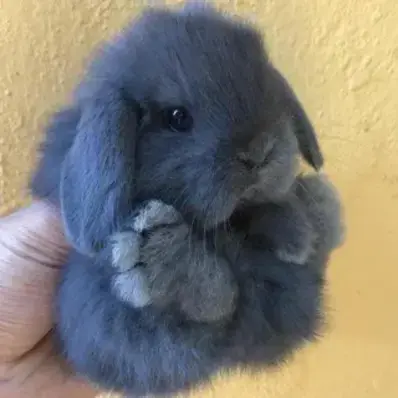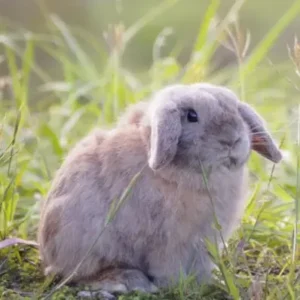History/Origin
Mini Lops, with their distinctive lop ears and lovable nature, have become a favorite among rabbit enthusiasts. Originating in Germany in the 1970s, they were initially bred by crossing small lop-eared rabbits with other breeds. This combination resulted in the creation of the Mini Lop we know and cherish today. It is now one of the most popular breeds of domestic rabbits in the United States and globally.
Personality
Mini Lops are cherished not only for their adorable appearance but also for their charming personalities. These delightful bunnies bring a unique blend of playfulness, curiosity, and affection to their interactions with humans.
Mini Lops thrive on social interaction. They enjoy spending time with their human companions and may even seek out attention and affection. Whether it’s gentle strokes or a cozy cuddle session, these bunnies love to be part of the family.
Physical Appearance
As the name suggests, Mini Lops are one of the smaller breeds of rabbits that come in a variety of colors. They are not alone with lopped-ears though; other lop-eared breeds include the Holland Lops, English Lops, and French Lops.
Here are the Mini Lop characteristics that define them:
- Size
Mini Lops rabbits are compact, with a small, rounded body that typically weighs between 3 to 4 pounds. Despite their small size, they have a sturdy build.
- Coat Color
Mini Lops come in a variety of colors and patterns, including solid, broken, and pointed white. Their fur is soft and dense.
Gender Differences
For Mini Lops, the differences between males and females are usually very subtle. Gender does not determine a rabbit’s personality, friendliness, or other characteristics. Similarly, there are very subtle physical differences in size and shape that are not very recognizable or noticeable to an untrained eye.
Feed/Nutrition
Maintaining a balanced and nutritious diet is crucial for the health of Mini Lops. A diet rich in hay, fresh vegetables, and high-quality rabbit pellets provides the essential nutrients they need.
Hay
Hay is a fundamental component of a Mini Lop’s diet, providing essential fiber for a healthy digestive system and helping wear down their continuously growing teeth. It’s recommended to offer unlimited amounts of fresh hay, and Mini Lop bunnies should ideally consume their body weight in hay every day.
Greens and Vegetables
Including fresh greens in your Mini Lop’s diet is essential for added nutrients. Aim to feed approximately 1 cup of fresh greens per 2 pounds of the rabbit’s weight daily.
Pellets
Fortified pellets are an important part of your Mini Lop’s diet, providing essential nutrients. The general guideline is to feed 1/4 cup of pellets per 4–5 pounds of rabbit weight per day. As adult Mini Lops are medium-sized rabbits, they should receive approximately 1/3 cup of pellets daily.
Treats
Treats should be given sparingly, and it’s crucial to avoid high-fat and high-sugar options. Oxbow offers a range of healthy rabbit treats in various flavors, providing a tasty yet nutritious option for your Mini Lop.
Water
A constant supply of fresh, clean water is a must for your Mini Lop. While water bottles are easier to keep clean, some rabbits may prefer drinking from bowls. Offering both options allows your bunny to choose their preference. Ensure the water source is regularly checked and refreshed to promote hydration.
Health
Mini Lops can be prone to several common health issues that all potential owners should know.
Mini Lops, with their distinctive long, floppy ears and adorable appearance, require attentive care to ensure optimal health. Here are some essential health considerations for these charming bunnies:
- Ear Problems
Mini Lops are prone to ear infections and ear mites due to their unique long ears. Regularly clean their ears with a rabbit-friendly ear cleaner, like Vetericyn Antimicrobial Pet Ear Rinse, under the guidance of your veterinarian. Check for debris, wax buildup, or signs of irritation, and consult a vet if needed.
- Dental Issues
A rabbit’s teeth continuously grow, necessitating proper care. Provide wooden chew toys and monitor for signs of dental problems, such as drooling or pawing at the face. Veterinary care may include sedation for teeth trimming or, in severe cases, surgery for tooth root abscess removal.
- Hairball Obstruction
Mini Lops, with their dense fur, may develop hairballs. Regular brushing helps prevent hairball problems. Large hairballs can lead to blockages, causing GI stasis. Be vigilant for signs of discomfort and seek veterinary care if needed.
- Gastrointestinal Stasis
A rabbit’s delicate digestive system requires constant motion. GI stasis, indicated by a lack of eating and stool passage, is a severe condition requiring immediate veterinary attention. Treatment involves hospitalization, medication, and nutritional support until the rabbit can eat independently.
- Parasites
Cheyletiella (walking dandruff) causes itching and hair loss. Diagnosis and treatment require a veterinary exam and prescription medication. Encephalitozoon cuniculi (E. cuniculi) is a parasite leading to nervous system issues; seek immediate vet attention for symptoms like head tilt, loss of balance, or seizures.
- Upper Respiratory Infection (URI)
Mini Lops are susceptible to respiratory infections. Look out for symptoms such as eye/nose discharge, sneezing, lack of appetite, and lethargy. Maintain a draft-free environment, opt for dust-free bedding like Carefresh, and ensure good cage sanitation to reduce the risk of URIs. Veterinary care and prescription antibiotics are often necessary for recovery.
Care and Grooming
Grooming Mini Lops involves brushing their soft fur regularly to prevent matting. Additionally, ensuring a clean living environment and providing opportunities for exercise contribute to their overall well-being.
Proper care and grooming play a pivotal role in keeping your bunny happy and thriving.
Here’s a guide to maintaining their overall health:
- Coat Care
Mini Lops boast dense, lustrous, medium-length fur, making grooming a crucial aspect of their care routine. Regular brushing, at least a few times a week, helps prevent matting and reduces the risk of hairballs. Pay extra attention to the areas behind the ears, under the chin, and around the tail, where fur tends to mat more easily.
- Nail Trimming
Routine nail trimming is essential to prevent discomfort and potential injury to your Mini Lop. Trim the nails every 4-6 weeks using a small animal nail clipper, or seek assistance from a veterinarian if you’re unsure.
- Dental Care
Mini Lops’ teeth grow continuously, and proper dental care is essential. Provide wooden chew toys to promote natural grinding and ensure their teeth remain healthy. If you suspect dental issues, seek prompt veterinary attention for examination and potential treatment.
- Environment
Create a safe and comfortable living environment for your Mini Lop to help them stay healthy. Ensure their enclosure is spacious with a cozy resting area and a designated space for play and exercise. Regularly clean and sanitize the cage, removing any soiled bedding to maintain hygienic living space.
- Social Interaction
Mini Lops are social creatures and thrive on human interaction. Spend quality time bonding with your bunny through gentle petting, playtime, and interaction. A happy and socially stimulated Mini Lop is likely to be healthier and more content.
- Handling and Trust-Building
Handle your Mini Lop gently from a young age to build trust. This makes grooming, nail trimming, and vet visits less stressful for both you and your bunny. Use positive reinforcement, such as treats and praise, to create a positive association with handling.
Rescue Groups
For those considering adopting a rabbit of the Mini Lop breed, rescue groups can be a great option. Organizations like Bunny Buddies and House Rabbit Society often have Mini Lops available for adoption.
Mini Lops for Sale
Interested in bringing home a Mini Lop? Reputable breeders and pet stores, have these adorable bunnies for sale.
Interesting Facts
- Mini Lops are related to other lop-eared rabbit breeds, such as the Dwarf Lop and Holland, due to their distinctive lop ears that hang down on either side of their heads.
- Despite their small size, they are playful and energetic.
- Mini Lops are popular participants in rabbit shows due to their charming appearance.
Best For
Ideal pet rabbits for families, singles, or seniors looking for a loving and low-maintenance pet that thrives on companionship.
Top Names for Mini Lops
| Male Mini Lop Names | Female Mini Lop Names |
| Thumper | Daisy |
| Oreo | Willow |
| Coco | Luna |
| Teddy | Rosie |
| Jasper | Mocha |









